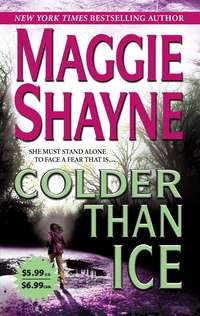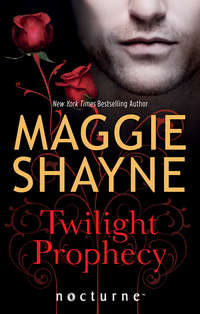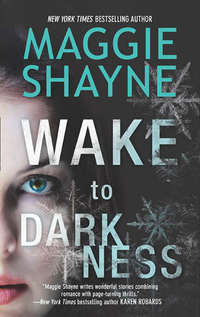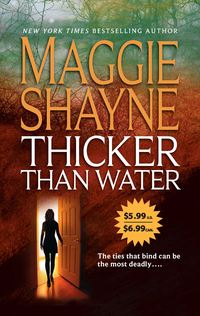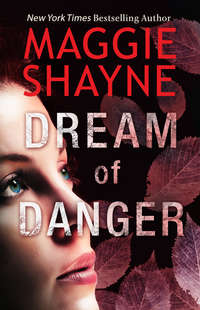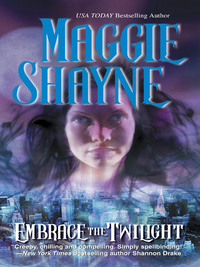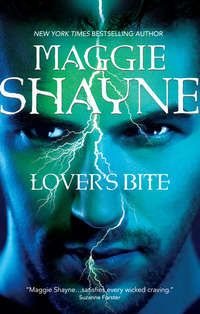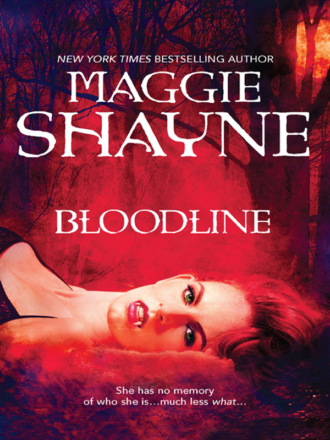
Полная версия
Bloodline

Praise for the novels of
MAGGIE SHAYNE
“The latest from bestseller Shayne is an interesting, inventive tale.”
—Publishers Weekly on Demon’s Kiss
“Suspense, mystery, danger and passion—no one does them better than Maggie Shayne.”
—Romance Reviews Today on Darker Than Midnight
“A tasty, tension-packed read.”
—Publishers Weekly on Thicker Than Water
“Maggie Shayne demonstrates an absolutely superb touch, blending fantasy and romance into an outstanding reading experience.”
—Romantic Times BOOKreviews on Embrace the Twilight
“Maggie Shayne is better than chocolate. She satisfies every wicked craving.”
—New York Times bestselling author Suzanne Forster
“Maggie Shayne delivers sheer delight, and fans new and old of her vampire series can rejoice.”
—Romantic Times BOOKreviews on Twilight Hunger
“Shayne’s haunting tale is intricately woven…. A moving mix of high suspense and romance, this haunting Halloween thriller will propel readers to bolt their doors at night!”
—Publishers Weekly on The Gingerbread Man
“Shayne’s talent knows no bounds!”
—Rendezvous
“Maggie Shayne delivers romance with sweeping intensity and bewitching passion.”
—New York Times bestselling author Jayne Ann Krentz
MAGGIE SHAYNE
BLOODLINE

Contents
Chapter 1
Chapter 2
Chapter 3
Chapter 4
Chapter 5
Chapter 6
Chapter 7
Chapter 8
Chapter 9
Chapter 10
Chapter 11
Chapter 12
Chapter 13
Chapter 14
Chapter 15
Chapter 16
Chapter 17
Chapter 18
Chapter 19
Chapter 20
Chapter 21
Chapter 22
1
My first thought upon waking was that maybe I was dead. It wasn’t until much later that I realized how accurate that initial, intuitive and seemingly irrational notion was. It popped into my consciousness as soon as consciousness itself appeared. It made no sense. It was based upon no reason. It was just there.
I must be dead.
And just as quickly as it had come, the thought was gone again.
I wasn’t dead. I was cold. But it was an odd kind of cold, because it didn’t make me shiver or feel uncomfortable, it was just an awareness of the fact. I was cold. And I was wet, too.
I opened my eyes slowly and blinked to wipe away the blur of sleep, for I must have been asleep. It was dark. Newborn darkness, though. It had that sense to it, though I wasn’t sure at that moment how it was I could sense newborn darkness from any other kind. It wasn’t something I would have thought came naturally to ordinary people. And it was certainly nothing I’d ever noticed before.
Or had I?
Oddly, I didn’t remember, but I dismissed the slightly queasy feeling that notion brought to my stomach and focused instead on my surroundings. The immediate ones first. Beneath me, dirt. Solid packed, damp, but not muddy. A few scraggly patches of crabgrass and dandelions struggling for survival here and there, and looking proud of their triumph in such inhospitable conditions. All right, then. I was on the ground. Not flat ground, but a hillside that sloped precariously downward to a stretch of pavement at the bottom. And on the other side of that pavement, another patch of ground, sloping upward—a mirror image of the one on which I lay. And above them both…a ceiling?
A bridge.
I was on the sloping ground beneath a bridge.
On either side of the bridge, rain poured from heaven’s open spigot, soaking the road at the bottom, except for the part of it that was sheltered.
Why, I wondered, am I lying outdoors, on the ground, under a bridge, in the rain, at night?
Naked.
Refocusing my attention on the things in closest proximity, I noted the damp sheet of cardboard that lay over me, like a makeshift blanket, and noted further that, aside from that, I wore nothing. It had that wet-cardboard smell to it, and as I flipped it off my body, I thought my skin did, as well.
I started to shake. Not from the cold, because the cold didn’t bother me and that had me worried. Maybe my nerves weren’t working just right, but at any rate, I was scared and I could feel panic creeping like ice water through my veins. I closed my eyes, firmed my spine, held my breath, then told myself, “Easy. Just take it easy. Just take it easy and figure this out. It can’t be all that difficult to figure this out.”
Nodding in response to my own advice, I opened my eyes again, and this time I looked down at my own body. I was long, and I was thin. Perhaps athletic, I thought, and it scared me that I didn’t know if that was true or not. Maybe I was just sickly. Although I didn’t feel sickly. And my body seemed more lean than skinny.
In fact, I felt…
Strong.
I opened my hands to see if they worked, then closed them again. I studied my slender arms, lengthy legs, small waist and hips nearly the same size, and my compact, round little breasts, as if I’d never seen them before. And then I noticed a lock of hair hanging over my shoulder, and I grasped it, lifting it to look and feel and smell it.
It was copper in color, the kind of hair they call auburn, I thought, and it was curly and long, long, long, just like the rest of me. But also like the rest of me, I had the feeling I’d never seen it before.
I stood up to see how long my hair was, and also to move around a bit. Maybe if I woke up more thoroughly, this fog in my head would clear and I would know who I was and what I was doing here in the middle of nowhere on the cusp of night, naked and alone.
So I stood there, noticing that my hair reached to the tops of my hipbones, until a sound jerked my attention away from it. Something running, scampering off in the distance. My head snapped toward the sound fast, and I felt my nose wrinkling and realized I was scenting the moist air. My eyes narrowed, and my mind thought, Rabbit. And then I saw it, scurrying from one clump of brush to the next, far in the distance. Perhaps as much as a half mile from me.
There was no possible way I could see a rabbit a half mile away in the dark, in the rain, much less identify it by smell.
And yet I had, and I realized, as my senses came to life one by one, that I could hear many things and smell even more—the flitting of a little bird’s wings and the scent of the leaves in his nest, the hushed flight of a moth and the smell of the fine powder on his body, the bubbling of a stream somewhere beyond sight and the smell of its water and even the fish that lived in its depths. I smelled autumn. There were decaying leaves, their aroma so pungent and wonderful and evocative that it overwhelmed almost everything else. It was comforting, that scent. I heard the sound of cars that had not yet come close enough to see, and I could smell their exhaust.
My brows drew together, and I pressed my fingertips to my forehead. “What am I?” I whispered.
Lights came into view then. Headlights, as a vehicle rolled closer and closer on the road below. I started to move carefully down the hill. My feet seemed extremely sensitive to every pebble, and I sucked air through my teeth, tasting everything it carried in its breath, but I hurried all the same.
I stopped halfway down just as the car rolled under the bridge, and I heard the brakes engage as the vehicle came to an abrupt stop, still ten feet from where I stood.
I didn’t move toward it. I just stood there, naked and waiting. There was something tingling up the back of my neck that felt like unease. Like a warning.
The car was black. Big and black. An SUV, I thought. An expensive one. My eyes slid toward the manufacturer’s logo on the front of the thing, and I saw laurel leaves encircling a shield, with blocks of color on its face. I thought I should remember it, though I wasn’t certain why. As I stared, unsure whether to move closer or turn away, the driver’s-side window, which was deeply tinted, moved downward just a little. A man’s voice said, “Get in.”
The chill along my nape turned icy. I shivered, and everything in me went tense and tight. I felt as if I were coiling up inside myself in preparation for flight, though I didn’t know why I should feel the urge to run. I ignored the impulse, but still I didn’t move.
And then, through the tiny gap in that window, I saw the black barrel of a gun, pointing right at my head, and the voice was cold this time. “I said get in.”
The spring that had been coiling up inside me released all at once. My body sprang into motion as if propelled by some outside force. I turned, I lunged, I leapt, soaring from the embankment to the pavement beyond the bridge, behind the car, where the rain was pounding down. Barely had my feet settled on the macadam before I was moving again. I accelerated into a dead run, the speed of which astounded me.
I heard tires spinning behind me, and then gunshots, three of them, so loud I thought my eardrums had split, but no pain came with those shots. The bullets, though certainly fired at me, had missed their mark. And when I dared to glance over my shoulder, I saw those headlights falling farther and farther behind me as I ran.
That didn’t make any sense at all. The car was chasing me, speeding after me along the same stretch of road. And I was on foot, running through the pouring rain. And yet I was pulling away.
Almost as an afterthought, I veered left, away from the pavement, and sped over uneven terrain, through an open field that was lush with grass and far easier on my tender feet. I ran until the car was long out of sight, and then I kept on running, because there was an ecstatic rush to it that I couldn’t understand.
I leapt over boulders and limbs that appeared in my path. I jumped over the stream I’d heard from so far away, expecting to land somewhere in the middle of it, but clearing it instead. I ran alongside a doe that I startled, and while she flared her nostrils and bounded away with her white tail flying its warning, I passed her, and kept on going.
God, what was this? How was this possible?
Finally, when I began to tire at last, I stopped and again tried to take stock of who and what I was, but I found nothing there.
Tabula rasa. The phrase echoed in my mind. Blank slate. It was as if whatever I had known or been before had been erased.
So instead of searching within me for answers, I took a look at my surroundings, because I would need, I thought, food and shelter and probably some clothing, if I hoped to survive long enough to figure out anything more. Those were the immediate requirements. And they were easier to face than the emptiness inside my mind. Thinking on that brought me to the edge of panic, and I had the feeling that, should I give in to it, I might never return.
I had run into a stand of forest, a woody little paradise, its floor lined with fallen leaves, and its trees awash in russet and scarlet and gold. I walked through it now, following my senses to its edge, where I could look out and see what lay beyond.
Another stretch of pavement, curving into what appeared to be a small town. I saw a tall pointed church steeple. I saw several oversize barns, and lots of little houses. They were clustered together in some places, farther apart in others. Smoke wafted from chimneys, and I smelled the wood burning, and the oil, too. But my eyes fell on one place in particular, a place well beyond a cluster of homes. I didn’t know why. It was far away in the distance. A red house with white shutters. It had a red barn and a lot of green land around it, all of it enclosed by white wooden fences.
And then a flash in my mind. A man, kissing me. Unfamiliar, powerful, wonderful feelings rushing through my body. Lips on mine. My hands tangling in dark hair.
And then it was gone. Gone, just that fast.
I wanted it back. I wanted more of it. But it had receded into the deep black waters inside my mind.
Sighing in disappointment, I returned my attention to that little red farmhouse. It was that place that drew my attention, though I had no idea why. Another place would have been far easier to reach. That one, the one that caught hold of me and held me in its grip, was well past the rest of the town, situated on a hillside and only visible from here because of the angle at which I stood. The town itself was close at hand. That place…that place was miles from me. Isolated. Lonely.
Calling out to me.
I had to go. And I had no idea why I was so compelled.
Yet, I rationalized, I’d had no idea why I’d felt a sense of panic when that car had stopped. And that feeling had proven accurate. So common sense dictated I should pay attention to my feelings. If my senses were somehow heightened beyond normal—which certainly seemed to be the case, since I could see and hear and smell things I shouldn’t be able to—and if my physical speed was also magnified—which it clearly was, since I had outrun a deer and a Cadillac…
Yes. A Cadillac Escalade. That was what that car had been. I smiled a little, slightly gratified to think tiny things were coming back to me.
But the point was, if all these other senses and strengths were somehow heightened, then maybe my intuitions were sharper than usual, as well. Though I couldn’t, just then, have said what “usual” might have been for me.
I would, I decided, trust my intuitions. I would go to that red farmhouse—no, I would go to its barn, which would be safer. That would be my shelter for the moment. And from there I would plan my next move.
So I walked down the slight grassy incline, away from the autumnal beauty of the woods, to the curving country road, and then, keeping to the softest part of the shoulder, I began walking, naked, toward that tiny town. And as I walked, I began to feel aware of a demanding, urgent hunger unlike any I had ever known before.
21 Years Ago
Serena blinked the drug-induced haze from her head and glanced up at the man in the white lab coat, with the stethoscope around his neck. He wasn’t looking at her, but at her chart.
“Where’s my baby? Can I see her now?” Then she smiled a little, through the fog. God, they must have given her a lot of drugs, she thought. “I’m already saying ‘her,’ when I don’t even know for sure, but I expected her to be a girl. Was she? Is she perfect and wonderful? How much did she weigh? Why haven’t the nurses brought her in to me yet?”
The doctor lowered the chart, replaced it on its hook at the foot of the bed, and then he came closer and reached down to pat her hand. Not hold it, just pat it. He wasn’t smiling.
Something clenched tight in the pit of Serena’s stomach. And suddenly she didn’t want to hear what he was going to say.
“It was a girl, yes. But…I’m very sorry, Serena. Your baby was stillborn.”
A sledgehammer hit her squarely in the chest. She fell back against the pillows as every whisper of breath was driven from her lungs. Her hand clutched her chest, because she couldn’t seem to draw more air back in. And then the doctor pressed his icy hand to the nape of her neck, pushing her head forward.
“Put your head down and breathe. Just breathe.” He hit a button on the wall behind the bed and snapped, “A little help in here,” then yanked something from his pocket, snapped it and held it underneath Serena’s nose.
The ammonia smell hit her and burned, making her gasp and jerk her head away. And then she was breathing. In and out. Breathing. As if nothing had happened.
“That’s better.” He glanced up as the door opened and a nurse entered. Pretty, blond and young.
Serena glanced at her only briefly before shooting her gaze straight back to the doctor. “It’s a lie,” she said. “It’s a lie. My baby was not stillborn.”
The nurse came closer. “I know how hard this is. I’m so sorry.”
“My baby was not stillborn,” Serena repeated. And she locked eyes with the doctor. “I heard her cry. I heard her cry.”
“You were heavily sedated,” the doctor said, with no hint of sympathy in his matter-of-fact tone. “This isn’t uncommon, this delusion of having heard the baby cry. I know it’s hard to understand, but it’s fairly normal.”
“I heard her cry,” Serena said again. And then she noticed that the blond nurse couldn’t meet her eyes.
“I’m ordering a sedative,” the doctor said as if she were no longer in the room, then he returned to the foot of the bed, grabbed the chart and scribbled something on it. “Get it into her, stat.”
Serena sat up straighter in the bed. “I don’t need a freaking sedative! I told you, I heard my baby cry. I heard her!” She shot her desperate gaze to the nurse. “I won’t take a sedative. I want a phone. I want the police. I want to know what you people did with my baby.”
“Your baby was stillborn,” the doctor said again.
And very subtly, so slightly that she couldn’t even be sure if she was imagining it, the nurse shook her head as she held Serena’s eyes.
“Get the Valium,” the doctor ordered.
The nurse—her name tag said Maureen Keenan, R.N.—hurried out the door. Serena wondered if she had really seen the silent message Nurse Keenan had sent—and whether the doctor had picked up on it.
No time to tell. He left on the nurse’s heels.
The second the door closed behind him, Serena scanned her hospital room, but there was no telephone in sight. Getting out of the bed, wincing at how sore she was, she went to the window and pressed the slats of the blinds apart so she could see outside.
The sun hung low in the sky. The parking lot lay beyond her window. She was on the second floor.
God, where was her baby?
She heard the door opening and dove back into the bed.
Nurse Keenan was back, syringe in her gloved hands. She came close to the bed, leaned down and clasped Serena’s forearm.
“I really don’t need that, Nurse Kee—”
“It’s Maureen, and I know you don’t need it,” the other woman whispered. “But you do need to listen and do exactly what I tell you. I want you to wait one hour. Pretend to be out cold, because this shit should knock you right on your ass. Understand?”
“But what’s going on? Where’s my baby?”
“I don’t know. I just know you need to get the hell out of here. One hour, then go out the window. Dangle from your hands, then let go, so it won’t be as far to fall. Maybe five feet. There will be a backpack in the bushes with everything you need. One hour, then go. Fake it till then.”
Footsteps came tapping along the hall, and Maureen quickly slid the needle into the pillow and depressed the plunger. “You’re out cold. There’s a clock over there.” She inclined her head slightly. “One hour, then get out. Your life depends on it.”
The door opened, and the doctor walked in. Serena closed her eyes and let her head sink onto the pillow as if she were completely relaxed. She made her breathing slow and even and deep.
“Did she give you any trouble?” he asked.
“Only a little. I talked her around. I think she likes me.”
His cold, gray, unfeeling eyes were still on her. Serena could feel them, even though hers were closed.
“She shouldn’t give us any more trouble tonight,” the bastard said.
“It’s hard on her. Poor thing, thinking she heard her baby cry. What do you suppose is behind that?” the nurse asked.
“You were there, Maureen.”
“Well, not in the room. I mean, I was in the unit, but not—”
“So? Did you hear a baby cry?”
It sounded almost like an accusation. Or maybe a challenge.
“No, Doctor Martin,” Nurse Keenan replied, in a tone that held no life. “I didn’t hear a thing.”
Serena knew it was a lie. She knew it right to her soul. Maureen Keenan knew. She had heard Serena’s baby cry, and she knew. And she wanted to help.
Serena wasn’t imagining anything. She hadn’t been hallucinating or deluded or reacting to drugs. Her daughter was alive. She was alive!
And if it took Serena the rest of her life, she would find her.
2
The Present
Ethan’s first chore in the evening was to see to Scylla and Charybdis. The draft horses were big enough to qualify as monsters, though he supposed naming them for sea serpents was a bit of a stretch.
He smiled at the notion of his companions as the legendary creatures from the tales of Ulysses—guarding his solitude, the way their namesakes had guarded the Straits of Messina.
As he strode through the deepening darkness, along the path that twisted from the house to the stable, he heard them blowing a soft welcome from within. They sensed him coming. They would sense danger, as well, and paw and snort their warnings. They seemed to understand that there were some—many—who wanted him dead.
He was almost to the stable and deep in thought when he stopped walking and lifted his head, suddenly picking up the clear scent of another of his own kind.
Another vampire. Close.
A Wildborn? Or one of the Bloodliners, like him? One trained to kill, and sent out to hunt him down and destroy him, as all escapees were hunted down and destroyed?
Standing utterly still, he honed his senses, feeling for the presence, sensing for any sign of a threat. The horses hadn’t pawed or stomped. They hadn’t blown in anger or snorted, the way they would if danger were near. Why not?
The presence was that of a female, and the only emotion coming from her was fear. She felt him, too; he could sense it. But not deliberately. She wasn’t scanning the airwaves for his vibration. She’d found it by accident. And now that she had, she wasn’t probing his mind, the way he’d taught himself to do with others since he’d stolen blood from the labs at The Farm and transformed himself two years ago.
He didn’t feel any hint of danger or menace. Even so, he tugged the pitchfork from its nail on the wall as he entered the barn. It would stab deeply, and she would bleed out well before the dawn brought sleep and its attendant healing power.
He stepped inside, his nose filling at once with the pleasing aromas of fresh, high-quality hay, straw bedding, honeyed oats and the scent of horseflesh, sharp and rich.
Scylla snorted softly and swished her tail. Not a warning, but a message that something had her wound up. Excited. Anxious, perhaps, but not afraid.
Easy, girl, Ethan thought at her. I already know someone’s here. Just not exactly…where.
He rounded a corner and met the mare’s eyes. She shook her mane, then shifted her gaze and bobbed her head up and down.
He nodded, then glanced at the stall beside hers, where Charybdis stood munching a mouthful of hay as if he hadn’t a care in the world. And a lot of help you are, Ethan thought. Though he knew if there were any real threat, Charybdis would be kicking down the stall door. Instead, the stallion only blinked at him and then went back to chewing.
Ethan shifted the pitchfork into his other hand and walked without making a sound toward the tack room’s red wooden door. It was closed. She was on the other side. The closer he got to the door, the more certain he was of that.
He glanced at the pitchfork in his hand and wondered what sort of weapons she might be intending to use on him. A gun? Some sort of electric-shock device, like the ones he’d been forced to wield against other innocent captives at The Farm? A blade, razor sharp and big enough to behead him? Was he insane to be walking into the tack room with only a pitchfork?
He didn’t see that he had any choice. If one of the Wildborns had found him, he had to kill it before it spread word of his existence, and that of his kind, to the rest of them. And if it was an assassin sent from The Farm, then the same reasoning applied. Kill or be killed.



